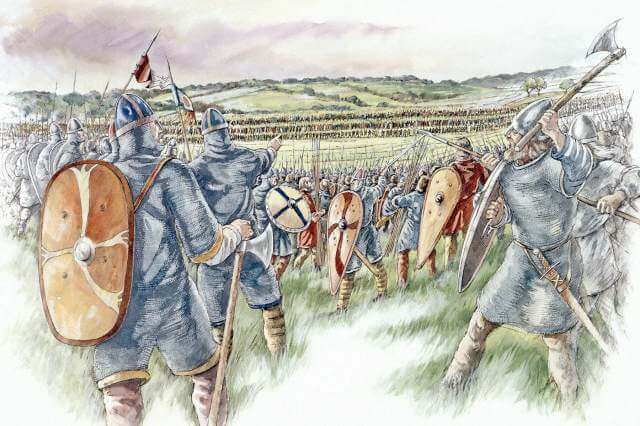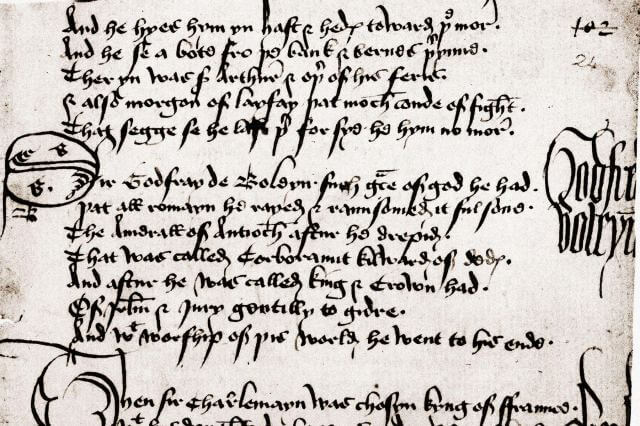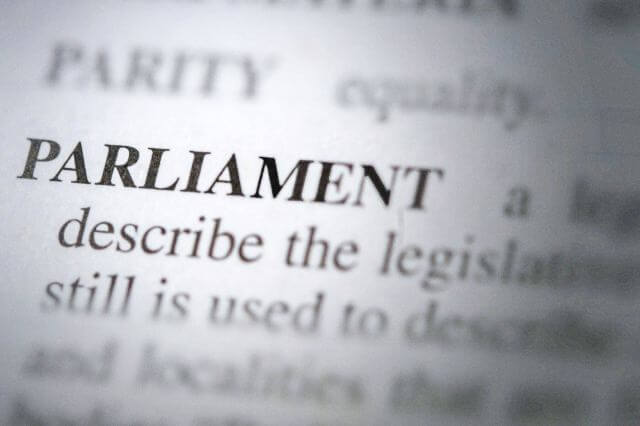English is one of the most predominant languages in the world, spoken by about 400 million people as their native tongue and by more than a billion others as a second language. Shaped by various linguistic influences over many centuries, English traces all the way back to the Proto-Indo-European language, which linguists believe originated in Eurasia around 4500 to 2500 BCE. It evolved into the Old English spoken by the Germanic tribes of Northern Europe and transformed after the Norman Conquest of England — one of the most significant turning points in the evolution of the English language. While the Germanic languages remain foundational elements of English, the French influence is surprisingly strong. Here’s how so many French words found their way into the modern English language — making French one of the easiest languages for an English speaker to learn on platforms such as Babbel.
 Credit: Heritage Images/ Hulton Fine Art Collection via Getty Images
Credit: Heritage Images/ Hulton Fine Art Collection via Getty ImagesOn October 14, 1066, William I of Normandy — known to history as William the Conqueror — invaded and defeated England in the Battle of Hastings. The Normans introduced a new ruling class; William was crowned king of England on December 25, 1066, and Norman nobility replaced King Harold II’s Anglo-Saxon aristocracy. The takeover marked the beginning of Norman rule and a major shift in English society — including its language.
The Normans, who were of Viking descent but had settled in the Normandy region of France, spoke Old Norman (a dialect of Old French), which largely derived from Latin. Following William’s conquest, and for the next 300 years, Old French — at that point known in England as Anglo-Norman — became the primary language spoken by English monarchs, elites, and government officials. Latin was also used, typically by the church and intellectuals, and it served as the primary language of written record. English, however, remained the primary language of everyday people, and over time, it started to become infused with the language of their rulers.
 Credit: Lakeview Images/ Alamy Stock Photo
Credit: Lakeview Images/ Alamy Stock PhotoThis period of linguistic amalgamation gave rise to the language known as Middle English. From around 1250 to 1400, a distinct new dialect began to take shape in England. Writing styles were heavily influenced by the French (or Latin) writing conventions; pronunciations shifted, and a substantial influx of French vocabulary cemented itself into the English language. It’s estimated that, during Norman rule, some 10,000 French words were adopted into English; about three-fourths of them are still used today. Given the English language is always changing and evolving, there is no real consensus for how many English words exist, but some linguists would estimate around 1 million words, roughly 30% or more of which come from French. The French influence remains so pervasive, it’s estimated that English speakers without any French language education may already know around 15,000 French words. It’s a helpful leg up when learning French on platforms such as Babbel.
 Credit: frank333/ Shutterstock
Credit: frank333/ ShutterstockThe influence of the French language on the development of modern English is still strongly felt. Words used today that originated with the Norman Conquest range from everyday terms used in law (“justice,” “attorney,” “judge”), government (“regime,” “parliament”), and the arts (“ballet,” “oeuvre”), to food (“beef,” “cuisine”) and fashion (“petite,” “chic”). Of course, given the Normans’ prestige, it’s no surprise that words such as “duke,” “countess,” “throne,” and, on the other end of the status spectrum, even “servant” are also of French origin.
French has influenced more than just the modern English vocabulary, however. It also changed pronunciation in many ways — such as not pronouncing a final unaccented “e” on a word, as well as how “g” now sounds in words such as “mirage.” Grammar and spelling were impacted, too: For instance, titles such as “consul general” retained the French manner of following a noun with the adjective, while words such as “queen” and “should” were spelled as “cwen” and “scolde” in Old English, until the French influence changed the language landscape forever.
England’s Latin, Old French, and Middle English trilingualism remained common until around the 15th century, when London and its dialect gained visibility in literary works from the likes of William Shakespeare and Geoffrey Chaucer. It ushered in a new phase of the language known as Early Modern English, which is closely related to the English we know today.
Comment (0)